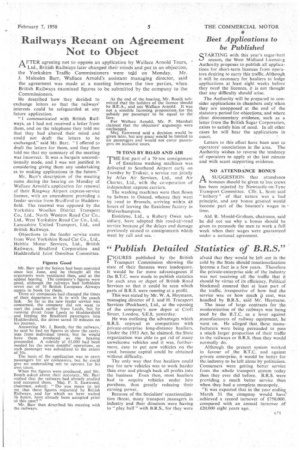"Publish Detailed Statistics of B.R.S."
Page 41

If you've noticed an error in this article please click here to report it so we can fix it.
L'IGURES published by the British I Transport Commission showing the state of their finances were inadequate. It would be far more advantageous if the B.T.C. were made to publish statistics for each area or depot of British Road Services SO that it could be seen which parts of B.R.S. were running at a profit.
This was stated by Mr. W. A. Heymann, managing director of J. and H. Transport Services (Peckham>, Ltd., at the opening of the company's new depot at Croft Street, London, S,E.8, yesterday.
He was outlining the advantages which B.R.S. enjoyed in conmetition with private-enterprise tong-distance hauliers. Under the 1953 Act, he claimed, the. State organization was able to get rid of many unwelcome vehicles and it was, furthermore, easy to put new vehicles on the road, because capital could be obtained without difficulty.
The only way that free hauliers could pay for new vehicles was to work harder than ever and plough back all profits into the business Even then, most hauliers had to acquire vehicles, under hire purchase, thus greatly reducing their earning power.
Because of the Socialists' renationalization threat, many transport ,manager in industry and their directors were having to "play halt"with 13.R.S., for they were
afraid that they would be left out in the cold by the State should renationalization
come a fact in a few years. Therefore the private-enterprise side of the industry was not receiving all the traffic that it shouldby virtue of its efficiency. Political blackmail ensured that at least part of the traffic, irrespective of how bad the service was or how much kt cost, was handled by B.R..S., said Mr. Heymann.
The issue of large contracts for the modernization of the railways was being used by the B.T.C. as a lever against manufacturers of railway equipment, he went on. He alleged that these manufacturers were being persuaded to pass a much larger proportion of their traffic to the railways or B.R.S. than they would normally do.
Although the present system worked in favour of the B.T.C. and against private enterprise, it would be better for the industry to be left alone by politicians. Consumers were getting better service from the ,whole transport system today than they ever did before. B.R.S. were providing a much better service than when they had a complete monopoly.
'It was expected that in the year ending March 31 the company would have achieved a record turnover of 1750,000. compared with an annual turnover of £20,000 eight years ago,
































































































































